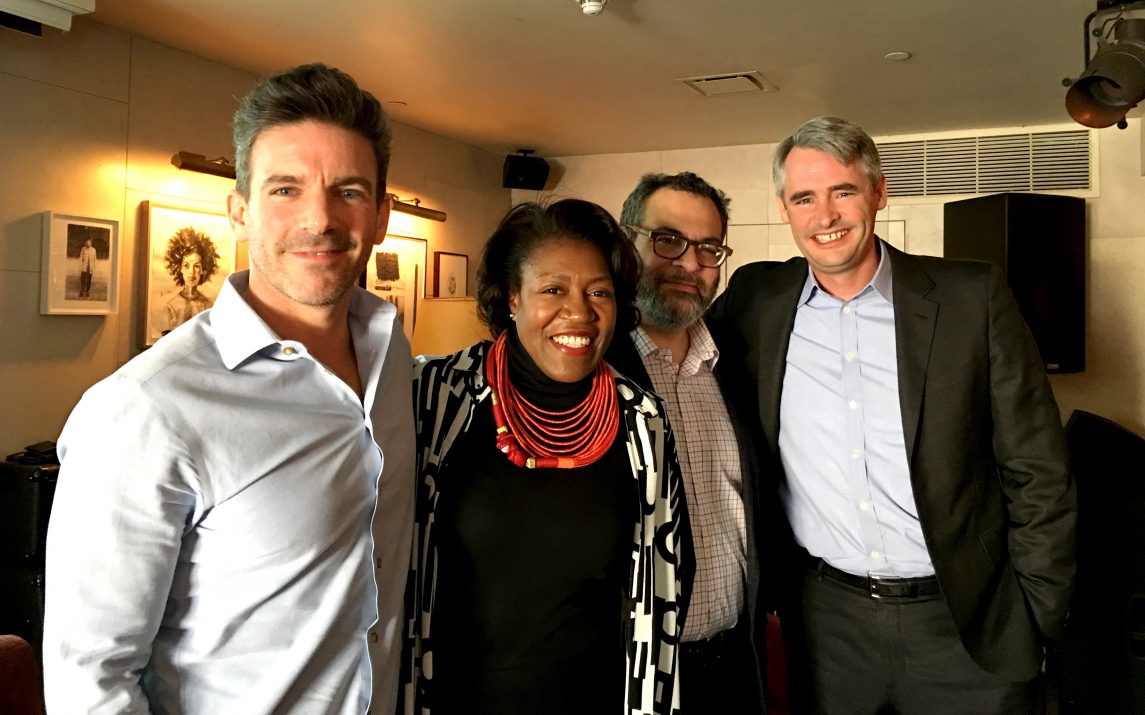(Panelists left to right: Brad Kay, President / Partner at SS+K, Robin Bennefield, Managing Editor at Marriott Traveler, Noah Mallin, Head of Social at MEC North America, Mike McCue, Cofounder / CEO at Flipboard)[/caption]
Fake news is everywhere. It even dominated the discussion at Flipboard’s first Curated Conversation New York last week. SS+K’s Brad Kay led a candid discussion with Marriott’s Robin Bennefield, MEC’s Noah Mallin, and Flipboard’s Mike McCue covering topics ranging from the limitations of algorithms, the future of brand loyalty, and the impact of consumer mindset. Check out the highlights from the conversation below.
Brad: People everywhere are questioning the integrity of their news. Everything is being viewed through a different lens. How can brands build trust in the wake of “fake news”?
Noah: The promise of the Internet was to level the playing the field, democratize content creation and consumption. And guess what? It’s happening and it’s nasty. We are learning a lot about democracy right now and it’s hard work. It’s no longer someone else’s problem. When each individual has to question the truth, it’s hard.
Mike: People have co-opted the phrase “fake news” to identify something they don’t agree with, but fake news is propaganda, or specifically inaccurate information promoted to advance a particular agenda. I think every platform that hosts stories and content needs to understand the mechanism behind fake news to be able to protect their users and create a safe environment for their brand partners.
Brad: How are you tackling it?
Mike: We curate content from the world’s most-trusted sources, and we employ trained journalists––people with expert eyes––to create a safe environment for everyone. Turns out that algorithms on their own fail at this task. There is no algorithm for true or false, or insightful, or cool, or meaningful. People drive those decisions. We work everyday to create an environment where meaningful dialogue is rewarded, not extremism. Brands have never had to worry about safety on Flipboard. And I believe all tech companies have a responsibility to not be partners in crime to propagandists.
Noah: I love that you’re talking about the limitations of algorithms. People have grown weary, and we are seeing declining engagement in the form of liking and commenting across every platform. People are leaning back, reading, and thinking, but not necessarily engaging outwardly. Conversations are happening in the dark through messaging, and marketers are panicking because they can’t see it.
Brad: How do companies navigate that issue?
Mike: I think companies need to identify meaningful metrics based on their core mission. We want to help people to advance themselves. This was the inspiration for Flipboard 4. We knew that if we could build something that could support quality journalism, we could help society. I think there’s a place in the world for a platform like that.
Brad: What makes a great story?
Robin: It goes back to the beginning of time. Storytelling has always lived on. A great story captures attention from the beginning. It takes knowing who your audience is, and speaking to them with authenticity.
Mike: To me, great stories are informative or inspiring. But to create that type of content authentically, brands are forced to ask themselves who they really are.
Brad: That’s such a great point especially as brands look for their voice in a moment where activism is critical. Do you jump into a debate on immigration or not? We are seeing that most brands don’t yet know who they are. They know their “true north” but they have to dig deeper to find the core beliefs that shape what they stand for. It doesn’t have to be political, but it’s time to be taking a stand on human rights, or education, or whatever is a true extension of your brand’s belief system.
Audience: Is brand loyalty dead?
Noah: When brand loyalty dies it will be because brands don’t define who they are, refuse to take a position, and fail to get to know their audience. You want everybody to love you but not everybody will. People spend money on connection and shared beliefs. It’s ok to alienate some folks sometimes.
Brad: What does the future of brand loyalty look like?
Mike: People are oversaturated with content and messages, and consumer behavior changes dramatically from one platform to the next. I think we are going to see both journalists and brands make the shift to quality over quantity when it comes to content and distribution. It’s essential for brands to connect with consumers that are proactively thinking about their future in quality, safe environments. Where do they want to travel next? Who do they want to be? The brands that will win will be the ones that enhance those aspirational moments with relevant and useful stories and products in the exact moment that people are engaged and open minded.
 ~Danika Azzarelli is reading Robotica on Flipboard.
~Danika Azzarelli is reading Robotica on Flipboard.

